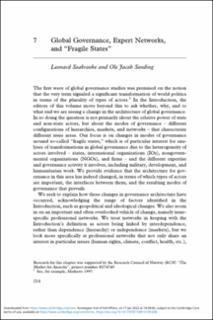| dc.contributor.author | Sending, Ole Jacob | |
| dc.contributor.author | Seabrooke, Leonard | |
| dc.date.accessioned | 2022-01-24T16:51:23Z | |
| dc.date.available | 2022-01-24T16:51:23Z | |
| dc.date.created | 2021-11-17T08:41:23Z | |
| dc.date.issued | 2021 | |
| dc.identifier.isbn | 1108824110 | |
| dc.identifier.uri | https://hdl.handle.net/11250/2839041 | |
| dc.description.abstract | The chapter discusses how expert networks within and outside the UN and other international organizations have shaped definitions and policy responses to "fragile states". We detail, in particular, the bifurcation of policy responses to fragile states owing to the proliferation of expert networks, with the original state building approach being replaced by two partly overlapping, partly diverging responses of investing in military capacity building on the one hand, and investing in humanitarian responses and the protection of civilians, on the other. | |
| dc.language.iso | eng | en_US |
| dc.relation.ispartof | Global Governance in a World of Change | |
| dc.rights | Attribution-NonCommercial-NoDerivatives 4.0 Internasjonal | * |
| dc.rights.uri | http://creativecommons.org/licenses/by-nc-nd/4.0/deed.no | * |
| dc.title | Global Governance, Expert Networks, and "Fragile States" | en_US |
| dc.type | Chapter | en_US |
| dc.description.version | publishedVersion | |
| dc.source.pagenumber | 214-233 | en_US |
| dc.identifier.cristin | 1955389 | |
| dc.relation.project | Norges forskningsråd: Market for Anarchy/project number 274740 | |
| cristin.ispublished | true | |
| cristin.fulltext | original | |
| cristin.qualitycode | 2 | |

